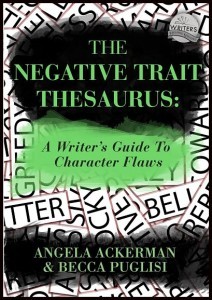How To Uncover Your Character’s Emotional Wound
To build a compelling character (and write them convincingly) we want to make them real as possible, and that means developing a backstory that lets us understand them on a deeper level. This brainstorming time allows us create their unique personality by seeing how the people and events of their past helped to shape them. Knowing who and what influenced a character gives us insight into what they might fear, desire, and need most of all. With these key pieces of information, we will know what motivates them, which in turn dictates their reactions, responses and behaviors in the story.
Even in real life, we have a backstory. Our pasts are filled with experiences, both good and bad, which helped teach us who to trust, what to believe in, and what to avoid. The more defining the experience or event, the deeper (and sometimes more painful) the lesson. This is all part of the human experience, and for us to create characters who feel realistic, we must try to mirror real life as much as possible as we plan and write.
 Of all the experiences in a character’s past, none is more trans-formative than one that wounds them emotionally.
Of all the experiences in a character’s past, none is more trans-formative than one that wounds them emotionally.Wounds are painful moments. A person is completely vulnerable, their emotions laid bare. And whatever the situation or event, the outcome is traumatic enough to change them on a deep, emotional level. Losing a loved one, suffering a humiliation at work, or simply having a parent’s love be withdrawn whenever one does not live up to impossibly high standards…whatever the wound, fear springs into being that one will suffer the same emotional pain if the character does not do something to prevent it.
This fear breeds flaws, negative personality aspects that act as emotional armor, keeping people (and thus more wounding experiences) at a distance. And while flaws appear to “help” by safeguarding one’s emotions, in reality they only do harm, inhibiting growth and damaging relationships. The Fatal Flaw especially has a key role in Character Arc, which the character must recognize and overcome if he is to achieve the growth needed to move past his wounds and obtain his goals. (If he doesn’t change, the flaw becomes a tragic flaw, and the story ends in tragedy.)
Clearly wounds are important. Choosing the right one for your character will help set the trajectory for your story, and crystallize the fear that holds him back. So how do we go about brainstorming this wounding event or situation, especially if you haven’t firmly decided what the story is about yet? Here are a few ideas:
UNDERSTAND HIS FEARS
Make a list of the things your character fears or worries about—small things or big things. His greatest fear, the one that he would never admit to having, is the key. Sometimes though, this fear likes to hide, and we need to dig deep. Pretend you are shadowing him for a day. Imagine what situations he avoids, and why. Think about the type of people he doesn’t like to be around. What sort of relationships is he comfortable with, and which ones bring him stress? What scenarios cause him to be emotionally volatile, and if they escalate, bring out the “fight or flight” reaction? What secrets does he keep? Watch him, observe him, and see what emotions he avoids all together, or is very uncomfortable feeling. These all hide clues to what unsettles him, and beneath that, what makes him feel vulnerable to the core.
UNDERSTAND HIS GREATEST NEED
 Two things motivate people more than anything else—fear and need. Needs are especially powerful, and if pushed, can cause a person to face down fear in order to satisfy a need. Basic Human Needs according to Maslow fall into five categories, giving us writers a terrific guide to determining what needs are not being filled.
Two things motivate people more than anything else—fear and need. Needs are especially powerful, and if pushed, can cause a person to face down fear in order to satisfy a need. Basic Human Needs according to Maslow fall into five categories, giving us writers a terrific guide to determining what needs are not being filled.
In real life, when an important need isn’t being met, sooner or later we instinctively maneuver to fill that need. So think about what is missing from your character’s life at the start of the story. What area of his life feels lacking or empty? How is he dissatisfied? Or alternatively, some stories start out where the Hero has everything until he hits the POT HOLE OF DOOM in your opening which throws his life into chaos. At that point, an important need is stripped away, and the hero must claw and bite and scratch to get it back by the end of the story.
Look over the Basic Human Needs structure. Think about which category might have a void in your character’s life. Once you determine the need that is missing, you can plan an event that “represents” the emotional heartache of having this very thing and then losing it. This will instill the fear the character has of meeting the need initially, leaving him believing he is fine without it. Think of a man who loses his wife to violence. Love and Belonging is what he lacks, but the fear and pain of loving and losing is strong enough to keep him from wanting to love again. Eventually though, an intense need will reach a critical point where it becomes a “missing limb,” always itching and throbbing, until the person yearns to be complete.
CHOOSE THE RIGHT THEME
There are many types of wounds, some big and some small. The wound in your character’s past may be a single experience, or exposure to an ongoing situation that left him changed or disillusioned. Here is a list of 7 Common Themes for Wounds. Have a poke around this list to see if there is a theme that your gut tells you is your character’s hot button.
 I hope this offers some ideas on choosing a wounding event or situation that will act as a symbol for what he must work through to fulfill the universal human need to grow. The Negative Trait Thesaurus also explores Emotional Wounds in greater depth.
I hope this offers some ideas on choosing a wounding event or situation that will act as a symbol for what he must work through to fulfill the universal human need to grow. The Negative Trait Thesaurus also explores Emotional Wounds in greater depth.
HEADS UP!
We are exploring Emotional Wounds in Thesaurus form starting this Saturday, so make sure to stop in for more help!
Image 1: cocoparisienne @ Pixabay
Image 2: wikapedia commons
The post How To Uncover Your Character’s Emotional Wound appeared first on WRITERS HELPING WRITERS™.
Writers Helping Writers
- Angela Ackerman's profile
- 1015 followers



